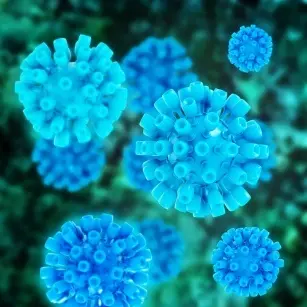
Hepatitis C Virus, or the so-called silent killer HCV virus causes hepatitis C viral hepatitis in an infected person. For many years, the disease develops in the vast majority of patients surreptitiously, without giving characteristic symptoms, to unexpectedly mark its presence with hepatocellular carcinoma or cirrhosis.
Epidemiological studies indicate 150-250 thousand cases of infection among the adult population in Poland, out of which only every 10th person is aware of hepatitis C.
From HCV to hepatitis
Virus HCV we most often become infected through contact with improperly sterilized cosmetic utensils or medical equipment, when it has been in contact with the blood of the carrier. We should not be afraid of shaking hands, hugging, a simple kiss, swimming with an infected person in the same pool or sneezing. The following situations are at risk:
- dental procedure,
- kidney dialysis,
- mole removal,
- blood donation,
- blood transfusion before 1993,
- shot,
- drug use, both intravenously and intranasally,
- first aid without protection,
- casual sexual contact (when in contact with blood, e.g. in the event of damage to the epidermis of the intimate area – no evidence of infection through contact with semen),
- infection of the newborn from the mother with the virus HCV, however, the probability is negligible and amounts to 5%,
- the use of shared cosmetic accessories, e.g. scissors.
Alarming symptoms
You may suspect the development of hepatitis C if you observe symptoms such as: chronic fatigue, excessive sleepiness, lack of vitality, depression, weight loss, nausea, vomiting, flatulence, lack of appetite, flu-like symptoms – fever muscle and joint pain, itchy skin, enlarged liver and spleen, yellowing of the whites, yellowing of the skin.
It is estimated that only 20% of people infected with the virus HCV finds the above symptoms in himself, which unfortunately often makes it impossible to start treatment. Patients sometimes learn about the infection by accident, e.g. during research on voluntary blood donation. In practice, in order to catch the infection, we must undergo tests for the presence of anti-HCV antibodies.
Hope for the infected
Modern medicine gives a chance to cure people with viral hepatitis. Symptomatic treatment consists in eliminating ailments, while causal treatment consists in eliminating the virus from the body. If we have been diagnosed with hepatitis C, we must contact an infectious disease doctor, to whom our family doctor will refer us.









